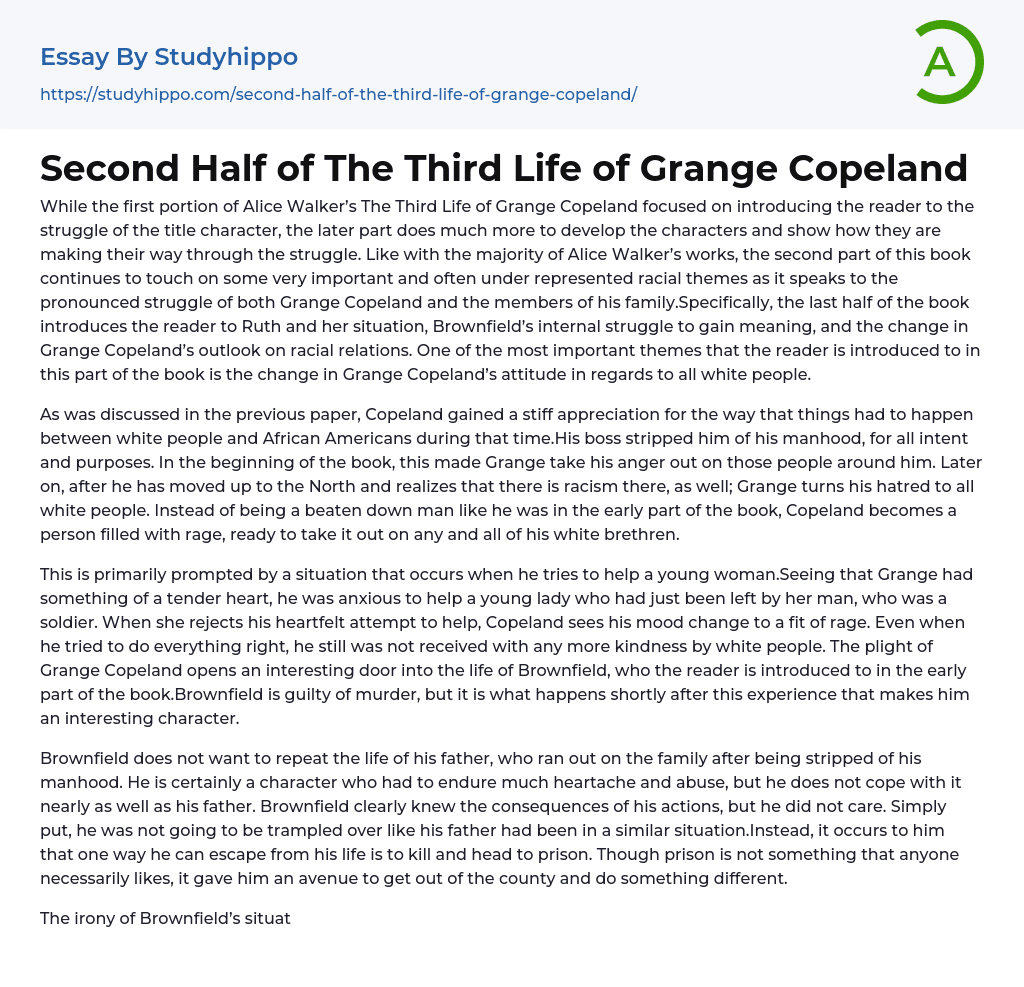

Second Half of The Third Life of Grange Copeland Essay Example
Alice Walker’s The Third Life of Grange Copeland delves into the struggles of its title character and his family members. The second half of the book focuses on character development and underrepresented racial themes. It introduces Ruth and her situation, Brownfield’s quest for meaning, and Grange Copeland’s changing outlook on racial relations. Of note is the shift in Grange Copeland’s attitude towards all white people.
In the previous paper, it was discussed how Copeland developed an understanding of the way African Americans were treated by white people during that era. Copeland felt like his boss emasculated him. This caused Grange to vent his anger on those around him at the start of the book. When he moves north and realizes racism still exists, Grange no longer focuses his hatred on just white individuals who demeaned
...him. Instead, he becomes a furious person ready to take his rage out on any and all white people. Copeland transforms from a broken man into a person filled with vengeance against his white brethren.
Grange Copeland attempts to assist a young woman who was abandoned by her soldier partner, but she rejects him and triggers his anger. This reveals the futility of Copeland's efforts to gain acceptance from white people. Through this experience, the reader is introduced to Brownfield, guilty of murder yet intriguing due to what follows. The plight of Copeland sheds light on Brownfield's life in the early part of the book.
Despite enduring hardships and mistreatment in his life, Brownfield is resolute in avoiding his father's path. Unlike his father, he struggles to cope with adversity. Despite being aware of the potential repercussions
Brownfield is indifferent and refuses to be controlled like his father. He intends to commit a homicide as a means of going to prison and escaping the county for a fresh start.
Despite Brownfield's efforts to distance himself from his father's ways, he ironically plunges into a tumultuous life. His decisions, made in an attempt to gain control over his situation, instead strip him of control. He surrenders his life due to the impact of his father's departure and union with Ruth. Grange Copeland's relationship with young Ruth drives the latter half of the story. Copeland struggles to share his complicated life with Ruth, although he attempts to communicate and educate her.
From feeling helpless to becoming furious, Copeland's actions may have been necessary but they ultimately inflict harm on those around him. In caring for Ruth, Grange Copeland sees an opportunity to redeem himself for past mistakes and shield her from the harsh realities of the world.
Grange Copeland sees it as a chance to correct past errors he made in dealing with Brownfield and prove to himself that he has changed. Ruth plays a vital role in the latter part of Copeland's journey, where he tries to seek redemption and acknowledge his mistakes. Initially, Copeland aims to fuel his animosity towards white people in Ruth. He intends for her to experience the same fury he feels and the apprehension he holds for life.
Despite his initial beliefs, Copeland is faced with a challenging realization that he possesses a boundless sense of empathy for Ruth. This new-found compassion prevents him from instructing Ruth on any matter related to hate. Grange, having endured the hardships of life,
empathizes with Ruth and others who seek his guidance to overcome their own struggles.
He desires to shield everyone from it, as he understands the corruption and toll it will inevitably take on their inner being. However, he soon discovers that attempting to manage this is exceedingly challenging. The latter section of Alice Walker's book concludes the racially charged features presented in the earlier chapters. Grange Copeland undergoes a lengthy journey and discovers fulfillment in that section of the book. Despite never entirely discovering the joy he had been seeking throughout the narrative, he utilizes the opportunity to reconcile with himself and share his wisdom with those around him. Copeland develops significantly throughout the book, especially when he confides in young Ruth about his experiences.
After realizing that his own protection would not suffice, he understood that both she and the others had to venture out into the harsh world alone in order to survive.
- Family essays
- Wealth essays
- Punctuality essays
- Carpe diem essays
- Persistence essays
- Chicken essays
- Crops essays
- Object essays
- Adaptation essays
- Love Story essays
- Mystery essays
- Thank You essays
- Hero essays
- Farm essays
- Focus essays
- Development essays
- Welding essays
- Nursing essays
- Integrity essays
- Hypocrisy essays
- Mother Tongue essays
- Contrast essays
- Secret essays
- First Love essays
- Motherhood essays
- Beauty essays
- Alcohol essays
- Aging essays
- Narcissism essays
- Myself essays
- Greed essays
- Limitations essays
- Fire essays
- House essays
- Peel essays
- Evil essays
- Humility essays
- Perspective essays
- Dream essays
- Change essays
- Choices essays
- Toys essays
- Experience essays
- Wisdom essays
- Transport essays
- Barbie Doll essays
- Adversity essays
- Lifestyle essays
- Housing essays
- Holiday essays



